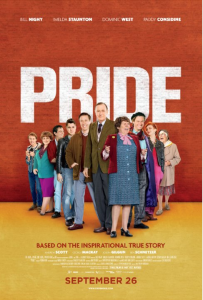film review: pride
Equality is everyone’s business. This is the overriding theme of Pride and it is communicated in the most compelling and uplifting way. If I hadn’t been immediately sold on that (which, of course, I was) I would’ve been sold on absolutely everything else about this film.
It’s the summer of 1984. Prime Minister Margaret Thatcher is busily earning her moniker ‘The Iron Lady’ and the people of the UK are doing it tough. Mark Ashton (Ben Schnetzer), is a young gay activist who is smart, ahead of his time and ready to get active for a noble cause. He mobilises a small group of lesbian and gay activists to come to the aid of the striking National Union of Mineworkers. While on the surface it seems like a completely illogical pairing, in the eyes of Mark the struggle for equal rights is shared across all marginalised groups. Mark recognises his own struggle in as a young gay man in the trials and tribulations of the miners. He knew that he needed to come to the aid of others. Rallying his fellow gay activists, he travels to a small mining village in Wales to support the Union’s cause.
The concept of intersectionality in campaigns for equality should be familiar, although it is rare to see it articulated so beautifully in film. While the struggles a Muslim woman living in Australian might be experiencing right now are very different to what a homosexual person would’ve gone through in 1980s Britain (legalised gay marriage was still decades away and AIDS a terrifying reality), there are basic commonalities to be found within each struggle for recognition of equal rights. Mark makes this observation passionately to Dai Donovan (Paddy Considine), a prominent member of a mining community in Wales, when he asked how one could be for gay rights but not for women’s rights or miners’ rights. You’re either for it all, or none of it.
Aside from the social justice elements, there are so many other reasons to see this film, including its masterful grasp of character development. Take Imelda Staunton: whether she is playing the sickeningly sweet psycho Professor Umbridge or abortion-rights campaigner Vera Drake, the woman is faultless. In Pride, she plays the ballsy Grandma we all secretly wish we had. Or Mark, who, the first time we meet him, we see a lover walking out of his bedroom – but Mark’s eyes are fixed on the television as Maggie Thatcher delivers a speech on the curtailing of worker’s rights. His lover attempts to get Mark’s attention before he leaves, but to no avail. From this moment, we know Mark is an activist, a champion for the downtrodden. This is his purpose. Likewise, Cliff (Bill Nighy), a man in his sixties, is set in his ways and, but through a series of hilarious encounters is slowly coaxed into a different way of thinking and being. To watch this character unfolding is heartening beyond measure.
The 1980s was a dark time for many but what we got out of it was immeasurably important. There are many unsung heroes that deserved to be praised and remembered, a task which Pride performs beautifully.



How can I contact Emma – I like her reviews and would like to talk to her directly
Hi Elize,
Feel free to shoot me an email at [email protected] and I’ll forward it to Emma 🙂
Jo
Pingback: Best Lesbian Date Movie Ever | BINARYTHIS